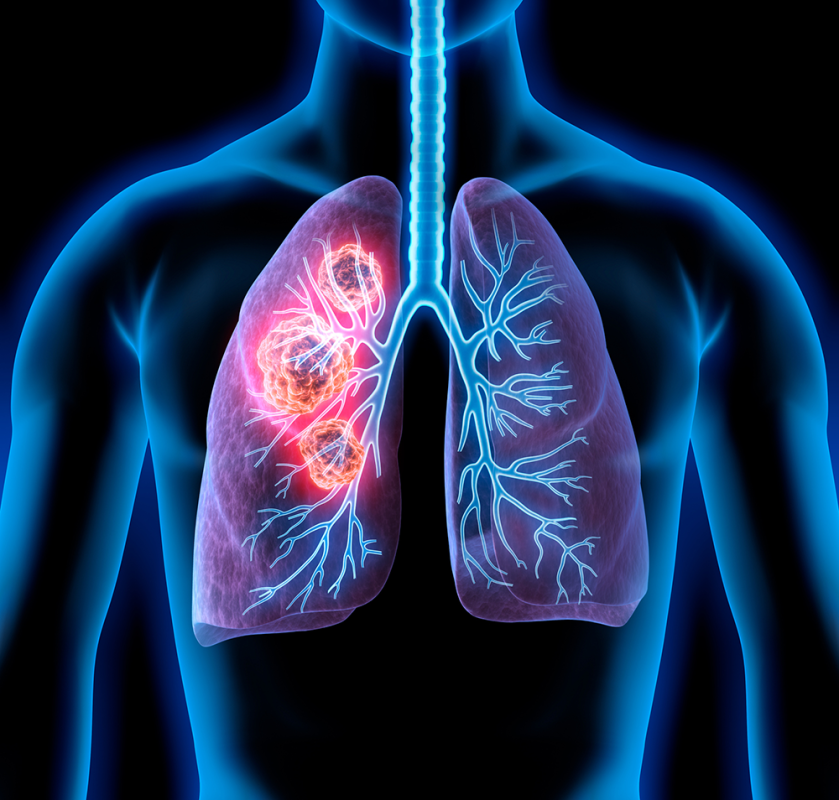If you don’t smoke, you’ve eliminated one of the biggest risk factors for developing lung cancer. But in the United States, about 10% to 20% of lung cancer diagnoses happen in people who have never smoked or have smoked fewer than 100 cigarettes in their lifetime.
When should a nonsmoker be concerned about lung cancer?
While researchers are still determining all of the causes of lung cancer in patients without a smoking history, the specialists at Minnesota Oncology say being aware of the risk factors and understanding how these cancers are diagnosed and treated can help you know when to seek testing.
Genetics and Environmental Factors Play a Role in Lung Cancer Diagnosis
When nonsmokers develop lung cancer, there is often a combination of factors. In many patients, genetics can play a role—studies have shown that genetic mutations and abnormalities often play a key role in driving lung cancer development. A family history of lung cancer may point to a predisposition for developing cancer cells.
Environmental factors also greatly impact the risk of lung cancer among nonsmokers:
- Radon gas exposure accounts for 21,000 lung cancer deaths a year. This invisible, odorless gas can be found in concentrated amounts inside homes built on soil containing uranium deposits.
- Secondhand smoke, breathed in from proximity to burning tobacco, has been linked to an estimated 7,000 lung cancer deaths per year.
- Prolonged or repeated exposure to carcinogens like asbestos, heavy metals, and exhaust fumes raises the risk for nonsmokers.
- Air pollution has been linked to lung cancer, though air quality regulation means the risk of cancer-causing levels of pollution in the United States is low.
Testing your home for radon, limiting exposure to secondhand smoke and carcinogens, and incorporating a variety of fruits and vegetables into a healthy, balanced diet are all things nonsmokers can do to lower their risk.
Know When You’re Eligible for Lung Cancer Testing
While lung cancer screening is not usually recommended for non-smokers, nonsmokers should speak with their physicians about any concerns they have with a family history of lung cancer or exposure to risky environments.
Early stages of lung cancer can be more difficult to detect in nonsmokers, who do not always show symptoms until cancer has progressed, but potential symptoms are similar to those in smokers:
- Consistent cough over a prolonged period
- Coughing up blood
- Chest pain or discomfort
- Trouble breathing
- Wheezing or hoarseness
- Loss of appetite or weight loss for no reason
- Fatigue
- Trouble swallowing
- Swelling in the face and/or the neck
- Recurrent lung infections, including pneumonia
If a physician determines a patient is eligible for lung cancer testing, diagnosis of lung cancer will start with a physical exam and a look at the patient’s medical history. A physician may request imaging, which could include chest X-rays, CT scans, MRIs, PET scans, bone scans, or ultrasounds. Cells from saliva, lung fluid, or a biopsy may also be examined to determine whether they are cancerous or if they have genetic changes.
Adenocarcinoma is the most commonly diagnosed lung cancer in non-smokers.
This type of cancer usually starts in the mucus-producing cells in the outer areas of the lungs. Cancer in nonsmokers tends to grow more slowly, making it less likely to spread to other parts of the body, but cancer can still recur in these cases.
Minnesota Oncology Physicians Provide Expert Lung Cancer Care in the Twin Cities
Lung cancer is treatable, but outcomes are better when the cancer is caught early.
Treatment options could include surgery, chemotherapy, radiation therapy, immunotherapies and new breakthrough drugs that are delivering promising outcomes for patients.
What a treatment plan looks like will vary depending on the individual. The team at Minnesota Oncology considers the needs of each patient.
If you’ve been recently diagnosed with lung cancer, contact us (844) 317-4673, or request an appointment online.




